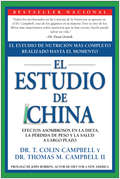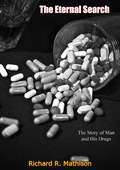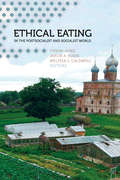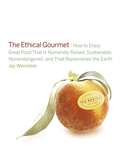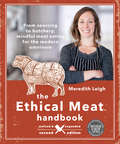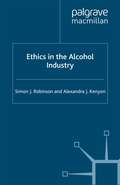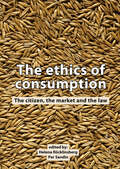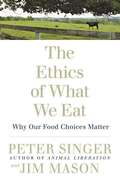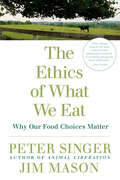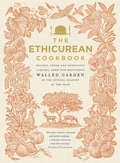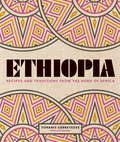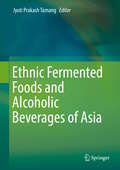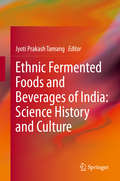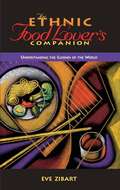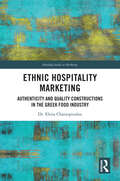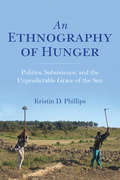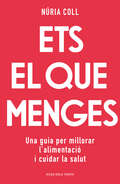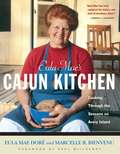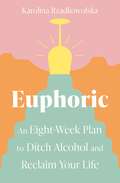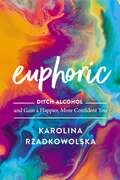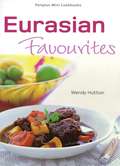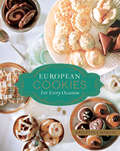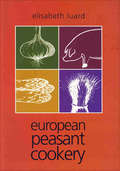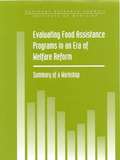- Table View
- List View
El Estudio de China: El Estudio de Nutrición Más Completo Realizado Hasta el Momento; Efectos Asombrosos En La Dieta, La Pérdida de Peso y La Salud a Largo Plazo
by T. Colin Campbell M. D. Thomas M. Campbell IIThe China Study: Startling Implications for Diet, Weight-Loss and Long-term Health is the definitive resource for anyone considering a plant-based diet and, because of this, more than a half million people have picked up the book.With the Hispanic community struggling with obesity rates like never before-for instance, Hispanic girls have 2-3 times the risk of having a high body mass index (BMI) than Caucasian girls of the same age-a plant-based diet can improve the health of an entire culture. This and many other facts nearly demand a release of The China Study Spanish-translation edition.
The Eternal Search: The Story of Man and His Drugs
by Richard R. MathisonA kaleidoscopic survey of the lore and legend of the World’s drugs and medicines.This unique and delightful anecdotal history of drugs and medicines pursues the important doctrines of medicine down through the centuries. Provides fascinating data on some of the by-paths, and it traces the old wives' tale to their origins.
Ethical Eating in the Postsocialist and Socialist World
by Yuson Jung Melissa L. Caldwell Jakob A. KleinCurrent discussions of the ethics around alternative food movements--concepts such as "local," "organic," and "fair trade"--tend to focus on their growth and significance in advanced capitalist societies. In this groundbreaking contribution to critical food studies, editors Yuson Jung, Jakob A. Klein, and Melissa L. Caldwell explore what constitutes "ethical food" and "ethical eating" in socialist and formerly socialist societies. With essays by anthropologists, sociologists, and geographers, this politically nuanced volume offers insight into the origins of alternative food movements and their place in today's global economy. Collectively, the essays cover discourses on food and morality; the material and social practices surrounding production, trade, and consumption; and the political and economic power of social movements in Bulgaria, China, Cuba, Lithuania, Russia, and Vietnam. Scholars and students will gain important historical and anthropological perspective on how the dynamics of state-market-citizen relations continue to shape the ethical and moral frameworks guiding food practices around the world.
The Ethical Gourmet: How to Enjoy Great Food That Is Humanely Raised, Sustainable, Nonendangered and That Replenishes the Earth
by Jay WeinsteinMore and more of us want to ensure that what we eat doesn't deplete resources, cause animal or human suffering, or lead to pollution. And, at the same time, we also want delicious food! If you are concerned about the environment, but unsure how to make a difference, here is a handbook for finding and cooking environmentally friendly and ethically produced foods. Chef and environmentalist Jay Weinstein has written the bible for those who care about both the well-being of the world and flavorful food. He informs us: * When organics really matter * Where to source humanely-raised meats and other ethically produced foods * How to make choices with a clean conscience when dining out. He also explores subjects ranging from genetically modified foods to being savvy about farmed fish, and why to avoid disposable wooden chopsticks and bottled water. By providing 100 healthy, sophisticated, and mouthwatering recipes, Jay Weinstein ensures that our ethical impulses are well rewarded. Dishes like Manchego-Potato Tacos with Pickled Jalapeños, Zucchini Spaghetti with Garlicky Clams and Grilled Bluefish, Pumpkin Basmati Rice Pilaf, and Coco-Vegetable Rice with Tamarind Chicken Skewers feature creative ways to use eco-friendly vegetables and legumes, sustainable seafood, and humanely raised animals.
The Ethical Meat Handbook: From Sourcing To Butchery, Mindful Meat Eating For The Modern Omnivore (Mother Earth News Books for Wiser Living)
by Meredith Leigh“Leigh will teach you how to raise animals, butcher them, and cook and cure their meat. Even better, she explains what it means and why it matters.” —Mark Essig, author of Lesser BeastsNutrition, environmental impact, ethics, sustainability—it seems like there’s no end to the food factors we must consider. At the center of the dietary storm is animal-based agriculture. Was your beef factory farmed or pasture-raised? Did your chicken free range, or was it raised in a battery cage? Have you, in short, met your meat?Most efforts to unravel the complexities of the production and consumption of animals tend to pit meat eaters and vegetarians against each other.In this second edition of The Ethical Meat Handbook, Meredith Leigh argues that by assuming responsibility for the food on our fork and the route by which it gets there, animals can be an optimal source of food, fiber, and environmental management. This new edition covers:Integrating animals into your garden or homesteadStep-by-step color photos for beef, pork, lamb, and poultry butchery100+ recipes for whole-animal cookingCulinary highlights: preparing difficult cuts, sauces, and extrasCharcuterie, including history, general science, principles, and tooling upThe economics and parameters for responsible meat productionEating diversely may be the most revolutionary action we can take to ensure the sustainability of our food system. The Ethical Meat Handbook, 2nd Edition challenges us to take a hard look at our dietary choices, increase self-reliance, and enjoy delicious food that benefits our health and our planet.“A powerful, positive book about a powerful, positive alternative, engaging us in shaping a new food and agriculture narrative.” —Jean-Martin Fortier, author of The Market Gardener
Ethics in the Alcohol Industry
by Simon J. Robinson Alexandra J. KenyonA close look at the ethical and social responsibilities of the alcohol industry in the 21st Century. It begins with a whistle stop tour of the historical developments of alcohol. It then critiques the legislative and voluntary codes surrounding the advertising industry, popular culture, religious groups, Government and local authorities.
The ethics of consumption
by Helena Röcklinsberg Per SandinWe are all consumers. What we consume, how, and how much, has consequences of great moral importance for humans, animals, and the environment. Great challenges lie ahead as we are facing population growth and climate change and reduced availability of fossil fuels. It is often argued that key to meeting those challenges is changing consumption patterns among individual as well as institutions, for instance through reducing meat consumption, switching to organic or fair trade products, boycotting or 'buycotting' certain products, or consuming less overall. There is considerable disagreement regarding how to bring this about, whose responsibility it is, and even whether it is desirable. Is it a question of political initiatives, producer responsibility, the virtues and vices of individual consumers in the developed world, or something else? Many of these issues pose profound intellectual challenges at the intersection of ethics, political philosophy, economics, and several other fields. This publication brings together contributions from scholars in numerous disciplines, including philosophy, law, economics, sociology and animal welfare, who explore the theme of 'the ethics of consumption' from different angles.
The Ethics Of What We Eat: Why Our Food Choices Matter
by Peter Singer Jim MasonPeter Singer, the groundbreaking ethicist whom The New Yorker calls the most influential philosopher alive teams up again with Jim Mason, his coauthor on the acclaimed Animal Factories, to set their critical sights on the food we buy and eat: where it comes from, how it is produced, and whether it was raised humanely. The Ethics of What We Eat explores the impact our food choices have on humans, animals, and the environment. Recognizing that not all of us will become vegetarians, Singer and Mason offer ways to make healthful, humane food choices. As they point out: You can be ethical without being fanatical.
The Ethics of What We Eat: Why Our Food Choices Matter
by Peter Singer Jim MasonPeter Singer, the groundbreaking ethicist whom The New Yorker calls the most influential philosopher alive teams up again with Jim Mason, his coauthor on the acclaimed Animal Factories, to set their critical sights on the food we buy and eat: where it comes from, how it is produced, and whether it was raised humanely. The Ethics of What We Eat explores the impact our food choices have on humans, animals, and the environment. Recognizing that not all of us will become vegetarians, Singer and Mason offer ways to make healthful, humane food choices. As they point out: You can be ethical without being fanatical.
The Ethicurean Cookbook: Recipes, foods and spirituous liquors, from our bounteous walled garden in the several seasons of the year
by The EthicureanThe Ethicurean philosophy is simple: eat local, celebrate native foods, live well.The Ethicurean is quietly changing the face of modern British cooking: all from a walled garden in the heart of the Mendip Hills. The Ethicurean Cookbook follows a year in their magnificent kitchen and garden, and celebrates the greatest food, drink and traditions of this fair land.The combinations are electric: confit rabbit is paired with lovage breadcrumbs, cured roe deer flirts with wood sorrel, and foraged nettle soup is fortified by a young Caerphilly. The salads are as fresh as a daisy: honeyed walnuts nestle amongst beetroot carpaccio, rich curd cheese is balanced by delicate cucumber. And the comfort of pies and puds - pork and juniper pie, Eccles cakes with Dorset Blue Vinny - is only enhanced by the apple juice, cider and beer poured in equal measure.With 120 recipes and a year of seasonal inspiration in photographs and words, Ethicureanism is a new British cooking manifesto.
Ethiopia: Recipes and traditions from the horn of Africa
by Yohanis GebreyesusWinner of a 2020 James Beard Foundation Book Award in the International categoryEthiopia stands as a land apart: never colonised, the country celebrates and preserves ancient traditions. The fascinating cuisine is enriched with the different religious influences of Judaism, Christianity and Islam - a combination unique to Africa. The delicious dishes featured are Doro Wat, chicken slowly stewed with berbere spice, Yeassa Alichia, curried fish stew, and Siga Tibs, flashfried beef cubes, as well as a wealth of vegetarian dishes such as Gomen, minced collard greens with ginger and garlic and Azifa, green lentil salad.Chef Yohanis takes the reader on a journey through all the essential dishes of his native country, including the traditional Injera made from the staple grain teff and synonymous with an Ethiopian feast, along the way telling wondrous stories of the local communities and customs. Complete with photography of the country's stunning landscapes and vibrant artisans, this book demonstrates why Ethiopian food should be considered as one of the world's greatest, most enchanting cuisines.
Ethiopia: Recipes and traditions from the horn of Africa
by Jeff Koehler Yohanis GebreyesusEthiopia stands as a land apart: never colonised, the country celebrates and preserves ancient traditions. The fascinating cuisine is enriched with the different religious influences of Judaism, Christianity and Islam - a combination unique to Africa. The delicious dishes featured are Doro Wat, chicken slowly stewed with berbere spice, Yeassa Alichia, curried fish stew, and Siga Tibs, flashfried beef cubes, as well as a wealth of vegetarian dishes such as Gomen, minced collard greens with ginger and garlic and Azifa, green lentil salad.Chef Yohanis takes the reader on a journey through all the essential dishes of his native country, including the traditional Injera synonymous with an Ethiopia feast, along the way telling wondrous stories of the local communities and customs. Complete with photography of the country's stunning landscapes and vibrant artisans, this book demonstrates why Ethiopian food should be considered as one of the world's greatest, most enchanting cuisines.
Ethnic Fermented Foods and Alcoholic Beverages of Asia
by Jyoti Prakash TamangAsiahas a long history of preparation and consumption of various types of ethnic fermentedfoods and alcoholic beverages based on available raw substrates of plant oranimal sources and also depending on agro-climatic conditions of the regions. Diversity offunctional microorganisms in Asian ethnic fermented foods and alcoholic beveragesconsists of bacteria (Lactic acid bacteria and Bacillus species, micrococcii, etc. ), amylolytic and alcohol-producingyeasts and filamentous moulds. Though there are hundreds of research articles, reviewpapers, and limited books on fermented foods and beverages, the present book: Ethnic Fermented Foods and Alcoholic Beverages of Asia is the firstof this kind on compilation of various ethnic fermented foods and alcoholic beveragesof Asia. This book has fifteen chapters covering different types of ethnic fermentedfoods and alcoholic beverages of Asia. Some of the authors are well-known scientistsand researchers with vast experiences in the field of fermented foods andbeverages who include Prof. Tek Chand Bhalla, Dr. Namrata Thapa (India),Prof. Yearul Kabir and Dr. MahmudHossain (Bangladesh), Prof. Tika Karki (Nepal), Dr. Saeed Akhtar (Pakistan),Prof. Sagarika Ekanayake (Sri Lanka), Dr. Werasit Sanpamongkolchai (Thailand), Prof. Sh. Demberel (Mongolia), Dr. Yoshiaki Kitamura, Dr. Ken-IchiKusumoto, Dr. Yukio Magariyama, Dr. Tetsuya Oguma, Dr. Toshiro Nagai, Dr. Soichi Furukawa, Dr. Chise Suzuki, Dr. Masataka Satomi, Dr. Kazunori Takamine,Dr. Naonori Tamaki and Dr. Sota Yamamoto (Japan), Prof. Dong-Hwa Shin, Prof. Cherl-Ho Lee, Dr. Young-Myoung Kim, Dr. Wan-Soo Park Dr. Jae-Ho Kim (South Korea) Dr. Maryam Tajabadi Ebrahimi (Iran), Dr. Francisco B. Elegado (Philippines), Prof. Ingrid Suryanti Surono (Indonesia), Dr. Vu Nguyen Thanh (Vietnam). Researchers, students, teachers, nutritionists,dieticians, food entrepreneurs, agriculturalist, government policy makers,ethnologists, sociologists and electronic media persons may read this book whokeep interest on biological importance of Asian fermented foods and beverages.
Ethnic Fermented Foods and Beverages of India: Science History and Culture
by Jyoti Prakash TamangThis book provides detailed information on the various ethnic fermented foods and beverages of India. India is home to a diverse food culture comprising fermented and non-fermented ethnic foods and alcoholic beverages. More than 350 different types of familiar, less-familiar and rare ethnic fermented foods and alcoholic beverages are traditionally prepared by the country’s diverse ethnic groups, and include alcoholic, milk, vegetable, bamboo, legume, meat, fish, and cereal based beverages. Most of the Indian ethnic fermented foods are naturally fermented, whereas the majority of the alcoholic beverages have been prepared using dry starter culture and the ‘back-sloping’ method for the past 6,000 years. A broad range of culturable and unculturable microbiomes and mycobiomes are associated with the fermentation and production of ethnic foods and alcoholic drinks in India. The book begins with detailed chapters on various aspects including food habits, dietary culture, and the history, microbiology and health benefits of fermented Indian food and beverages. Subsequent chapters describe unique and region-specific ethnic fermented foods and beverages from all 28 states and 9 union territories. In turn the classification of various ethnic fermented foods and beverages, their traditional methods of preparation, culinary practices and mode of consumption, socio-economy, ethnic values, microbiology, food safety, nutritional value, and process optimization in some foods are discussed in details with original pictures. In closing, the book addresses the medicinal properties of the fermented food products and their health benefits, together with corresponding safety regulations.
The Ethnic Food Lover's Companion
by Eve ZibartNowhere is America's rich ethnic and cultural diversity more apparent than in its restaurants. Every city and region of the United States has a unique cultural heritage - whether it's Cuban, Thai, Spanish, Italian, Indian, French or German - reflected in its dining choices. So what do you order in an ethnic restaurant, and how do you eat? The Ethnic Food Lover's Companion provides all the information you need to make every ethnic dining experience a pleasant and memorable one. In this book you will find information about what to expect in any type of ethnic restaurant; detail profiles of each ethnic cuisine, including key ingredients, spices and methods of preparation; cultural tips to put you at ease with the customs and etiquette of each cuisine; representative dishes of each cuisine defined and described; recommended complete meals from appetizer through dessert and easy recipes you can prepare at home.
Ethnic Hospitality Marketing: Authenticity and Quality Constructions in the Greek Food Industry (Routledge Studies in Marketing)
by Elena ChatzopoulouEthnic-themed restaurants are informal but powerful ambassadors for a country’s culture and contributors to local and national economies. Communicating authenticity and quality are essential characteristics in the development of a competitive and effective marketing strategy for restaurants. This book analyses how authenticity and quality perceptions are both constructed and communicated within the ethnic dining sector. Drawing on qualitative research methods, the book explores examples from the Greek food industry to analyse restaurateurs’ and consumers’ constructed meanings of authenticity, and how it is transmitted and received. It follows by exploring the marketing implications of consumer constructs and effective promotional methods to aid restaurateurs to better engage with customers whilst also respecting their culinary culture. It also guides the reader through the use of NVivo for research purposes, and its utilisations to facilitate inductive and interpretive analyses. This book offers a valuable resource for researchers across marketing, including consumer behaviour, food marketing, marketing research and communications. The data analysis tools explored are also transferable to a wide range of sectors outside of food and dining.
An Ethnography of Hunger: Politics, Subsistence, and the Unpredictable Grace of the Sun (Framing the Global)
by Kristin D PhillipsIn An Ethnography of Hunger Kristin D. Phillips examines how rural farmers in central Tanzania negotiate the interconnected projects of subsistence, politics, and rural development. Writing against stereotypical Western media images of spectacular famine in Africa, she examines how people live with—rather than die from—hunger. Through tracing the seasonal cycles of drought, plenty, and suffering and the political cycles of elections, development, and state extraction, Phillips studies hunger as a pattern of relationships and practices that organizes access to food and profoundly shapes agrarian lives and livelihoods. Amid extreme inequality and unpredictability, rural people pursue subsistence by alternating between—and sometimes combining—rights and reciprocity, a political form that she calls "subsistence citizenship." Phillips argues that studying subsistence is essential to understanding the persistence of global poverty, how people vote, and why development projects succeed or fail.
Ets el que menges: Una guia per millorar l'alimentació i cuidar la salut
by Núria CollLa periodista i divulgadora de temes de salut més reconeguda del nostre país ens explica tot allò que sap sobre nutrició i vida sana. Uneix-te als milers de seguidors de la revolució saludable amb els consells de Núria Coll. Menjar saludable no és difícil, però de vegades ens perdem entre tantes dades i dietes de moda. No cal aprendre cada nou estudi nutricional; probablement ens serviria més aturar-nos i pensar una mica. En aquest llibre de reflexions i consells la periodista especialitzada en alimentació saludable, Núria Coll, amb idees i pensaments basats en el sentit comú, ens proposa un objectiu clar: despertar al lector l'ambició de tenir un criteri propi perquè no depengui del que és que els gurus diuen que cal menjar. Aquest llibre t'empoderarà per trobar el teu propi camí en la teva alimentació. «Quan al 2014 vaig començar en la divulgació de l'alimentació saludable, no tenia gaire coneixements, però en poc temps em vaig adonar que, de manera urgent, havíem d'evitar molts dels pots i paquets que omplen els nostres rebosts. En qüestió de setmanes vaig canviar els meus hàbits alimentaris de forma radical, vaig començar a menjar saludable i vaig aprendre una cosa crucial: l'important no era només què menjar, sinó com.»
Eula Mae's Cajun Kitchen: Cooking Through the Seasons on Avery Island
by Marcelle Bienvenu Eula Mae DoreCooking through the seasons on Avery island in Louisiana.
Euphoric: An Eight-Week Plan to Ditch Alcohol and Reclaim Your Life
by Karolina RzadkowolskaEuphoric will guide you on your journey to an alcohol-free lifestyle, putting the focus on happiness, well-being and self-love to create the life you want.Breaking old habits is never easy, and when the temptation of alcohol is always present in your social life, it can be hard to make the change to go teetotal. But what if you found a new way to maximise the joy a drink can offer without the health implications?Certified alcohol-free life coach Karolina Rzadkowolska has helped thousands of casual drinkers transform their relationship with drinking. In Euphoric, she shares a proven, eight-week strategy to ditch alcohol and learn how to:· Create a natural buzz that alcohol can only mimic· Be fully present with your friends and family· Feel more energised, look better and live healthier· Enjoy the best sleep of your life· Have fun in any social situation without drinking· Accomplish new goals with your newfound driveReclaim yourself and rejuvenate your passions, as you make alcohol insignificant in your life and get motivated to chase your biggest dreams.
Euphoric: Ditch Alcohol and Gain a Happier, More Confident You
by Karolina RzadkowolskaEuphoric is your 8-week plan for an alcohol-free lifestyle that can lead to more happiness, well-being, and self-love. It&’s the modern woman&’s guide to relax without alcohol, find freedom from cravings and fitting in, and create the life you want--along with the audacity to go after it. Imagine a program that makes the benefits of &“Dry January&” last all year. That&’s Euphoric!Alcohol is everywhere in our society, and it&’s hard to resist. The pressures to fit in and have &“just one drink&”--that turns into several--whether at a party or on a casual Friday night, can lead to an imbalanced life that&’s plagued with unhealthy habits, low self-esteem, and decreased productivity.How can you change your relationship with alcohol without feeling deprived or like a social outcast? First, decide you want a change and then pick up Euphoric,from certified alcohol-free life coach Karolina Rzadkowolska.Karolina has helped thousands of casual drinkers transform their relationship with alcohol, including herself. In Euphoric, she shares a proven strategy to make alcohol insignificant in your life. In just eight weeks, you can ditch alcohol and learn how to:Create a natural buzz that alcohol can only mimicBe fully present with your kids, partner, and friendsFeel more energized, look better, and live healthierEnjoy the best sleep of your lifeHave fun in any social situation, without drinkingAccomplish goals with your newfound driveBecome confident to chase your biggest dreamsEuphoric presents an 8-week, easy-to-customize plan for anyone who wants to transform their relationship with alcohol and experience the life-changing benefits that happen when you take a break from booze to focus the health of your mind, body, and soul.Here&’s the plan!Week 1: Examine and Dismantle Limiting BeliefsWeek 2: Let Go of ShameWeek 3: Step into Your Best HealthWeek 4: Navigate Your Social LifeWeek 5: Get Mindful and Embody Self-LoveWeek 6: Find Pure and Utter HappinessWeek 7: Create Your Dream LifeWeek 8: Step into Your PurposeReclaim yourself and rejuvenate your life, as you make alcohol irrelevant and get motivated to claim a new lifestyle clearly focused on your goals, priority, and values.
Eurasian Favorites
by Wendy HuttonEurasian food is the original East-West cuisine, a blending of European and Asian ingredients and cooking styles which began four centuries ago when the Portuguese colonized Goa on India's west coast. This easy to use cookbook features authentic recipes from all over the continent and allows you to make delicious and flavorful meals that all will enjoy. Eurasian Favorites contains recipes for appetizers, soups, desserts, seafood, meat, poultry, rice, noodles, vegetables, and pickles. Recipes include: Crab and potato cakesMulligatawnySemolina cakePementa (Sambal pepper prawns) Pork vindalooShepherd's pieChicken curry devilAnd many more! Also included in this book are unit conversion tables, dual unit measurements, an overview of the most essential Eurasian ingredients, and over 30 large clear photos. Each recipe includes cook time, prep time, and serving sizes. Enjoy!
European Cookies for Every Occasion
by Krisztina MaksaiTraditional and contemporary recipes that include easy-to-follow step-by-step illustrated instructions for cookies, pralines, bars, and more
European Peasant Cookery
by Elisabeth LuardRecipes reflecting the rich traditions of twenty-five countries, passed down through generations. Peasant cookery offers healthy, real food—and is as relevant now as it was centuries ago. In this remarkable book, Elisabeth Luard sets out to record the principles of European cookery and to rediscover what has been lost in over-refinement. The recipes come from twenty-five countries, ranging from Ireland in the west to Romania in the east, Iceland in the north to Turkey in the south. This enormous compendium covers vegetable dishes; potato dishes; beans, lentils, polenta, and cornmeal; rice, pasta, and noodles; eggs, milk, and cheeses; fish, poultry, small game, pork, shepherd's meats; breads and yeast pastries; sweet dishes; preserves; and more. Filled with an authenticity rooted in Elisabeth Luard&’s years of living and cooking in Europe, these recipes are peppered with hundreds of fascinating anecdotes and little known facts about local history and folklore.
Evaluating Food Assistance Programs in an Era of Welfare Reform: Summary of a Workshop
by Committee on National StatisticsSummary of a public policy workshop in 1999 sponsored by the Commission on Behavioral and Social Sciences and Education (CBASSE)
